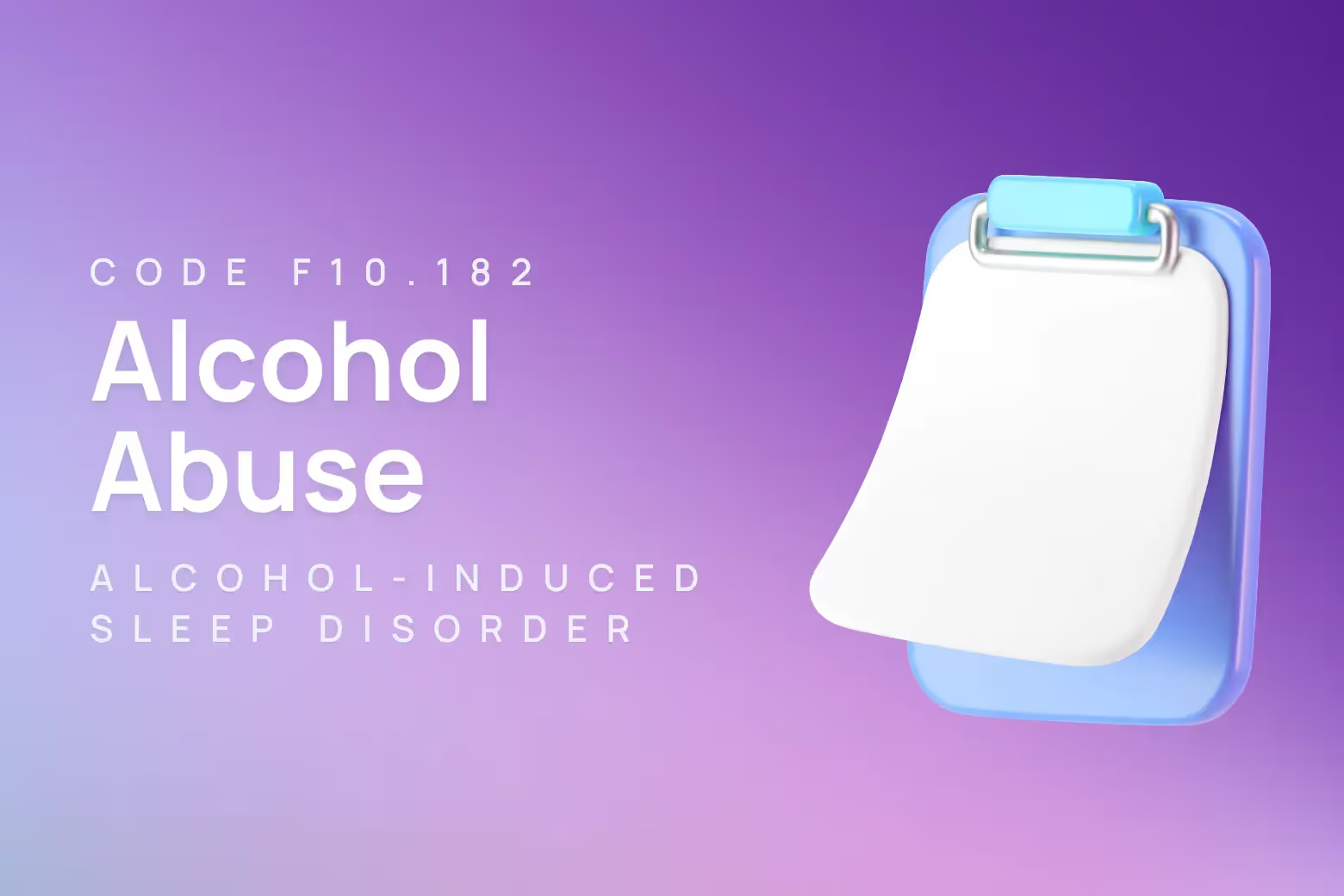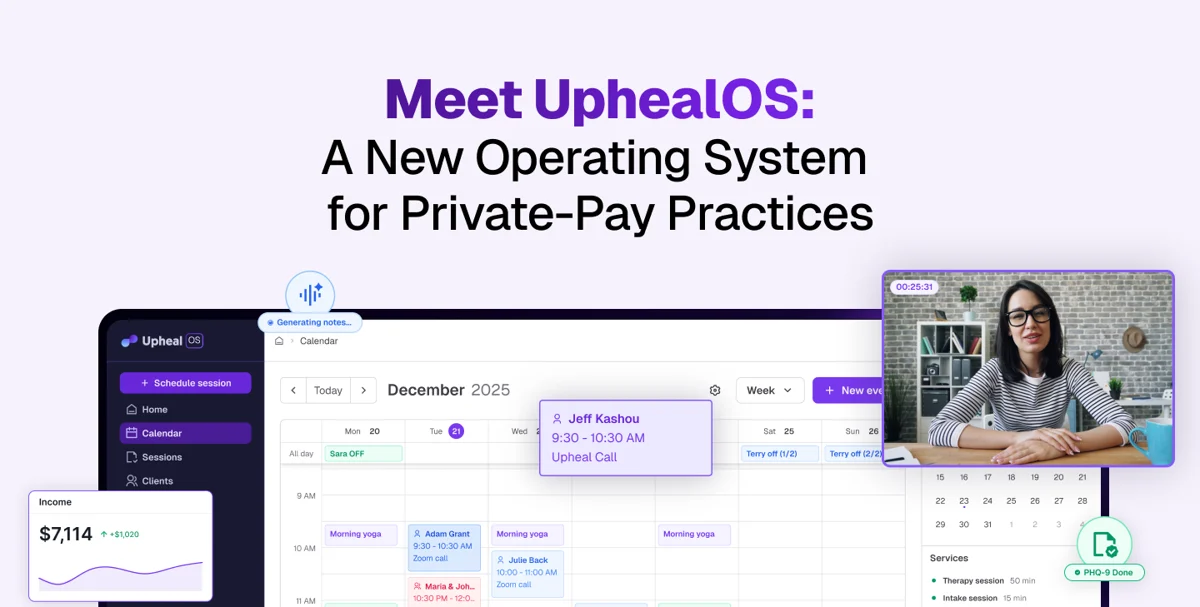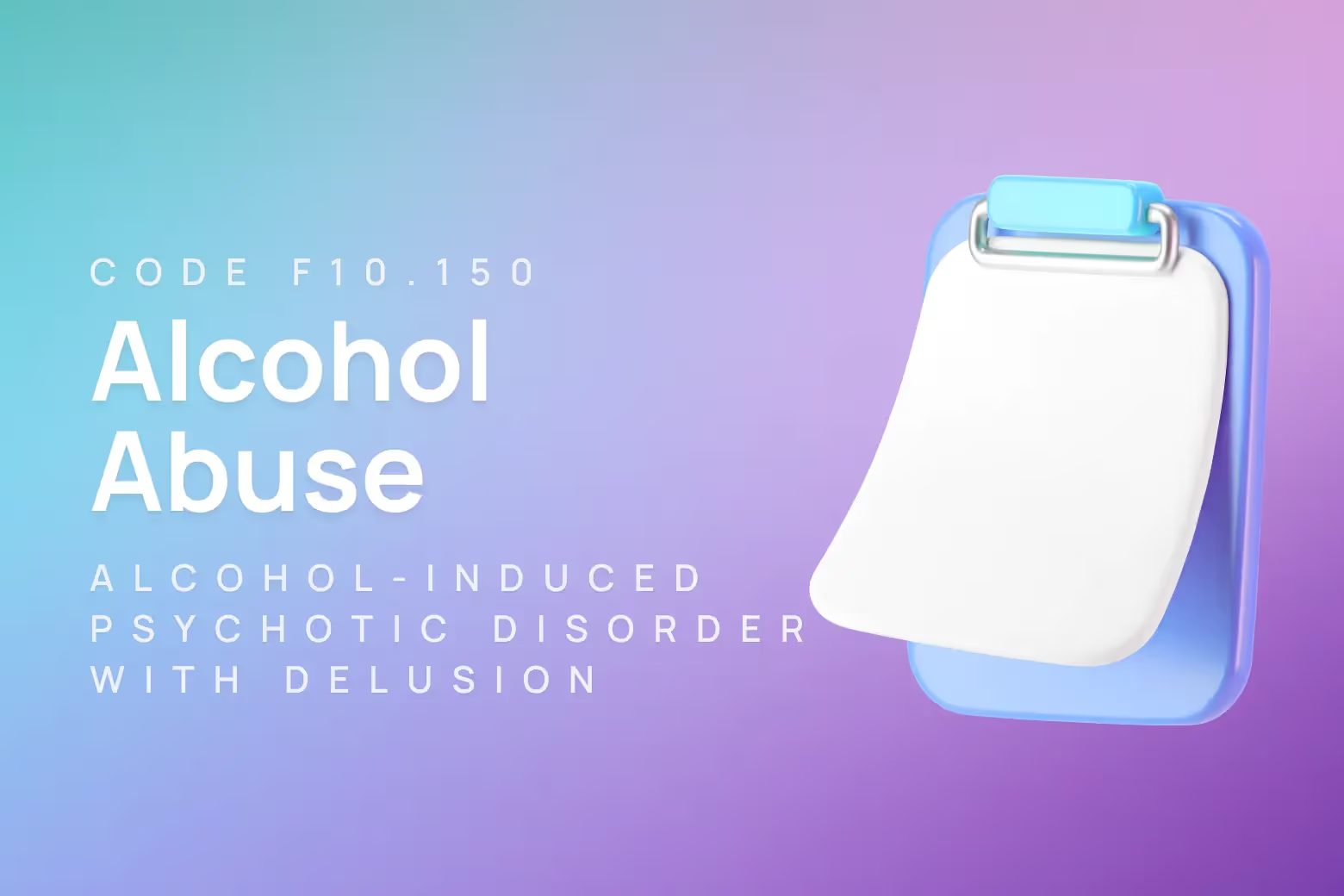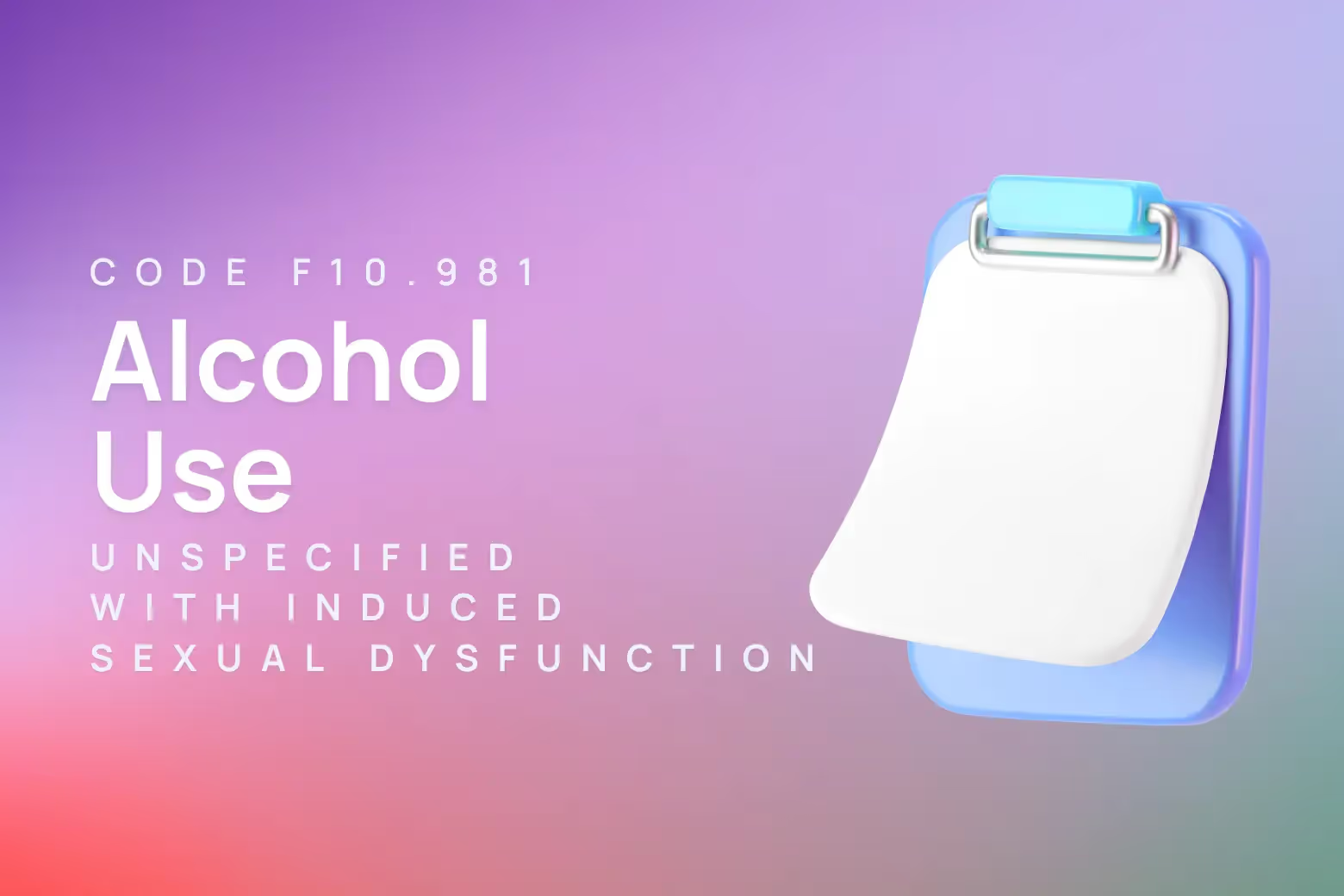ICD-10 code for alcohol abuse with alcohol-induced sleep disorder

F10.182 is the ICD-10 code for alcohol abuse with alcohol-induced sleep disorder.
This specific code applies when a client meets criteria for alcohol abuse and experiences sleep disturbances directly caused by their alcohol use patterns.
Proper diagnostic coding helps ensure accurate treatment planning and appropriate insurance authorization for specialized care addressing both the substance use and sleep complications.
Key features:
- F10.182 ICD-10 code represents alcohol abuse accompanied by sleep disturbances specifically caused by alcohol use
- Requires meeting both alcohol use disorder criteria and evidence of alcohol-induced sleep problems
- Sleep disruption must be beyond typical intoxication or withdrawal effects
- Documentation must clearly link sleep issues to alcohol use patterns rather than independent sleep disorders

Diagnostic criteria for alcohol abuse with alcohol-induced sleep disorder (F10.182)
Clinicians must establish two distinct but related diagnostic components when assigning F10.182.
The client needs to demonstrate a problematic pattern of alcohol use resulting in clinically significant impairment or distress.
This pattern requires at least two symptoms occurring within a 12-month period.
These include taking alcohol in larger amounts than intended, persistent desire or failed attempts to reduce use, excessive time spent obtaining or using alcohol, or continuing use despite physical or psychological problems.
Additional criteria encompass failure to meet major obligations, continued use despite social problems, giving up important activities, using alcohol in hazardous situations, tolerance development, or withdrawal symptoms.
The alcohol-induced sleep disorder component involves sleep disturbances that develop during or shortly after alcohol use, intoxication, or withdrawal.
Sleep problems must persist beyond typical hangover effects and significantly impair functioning.
These disturbances commonly include difficulty falling asleep, frequent nighttime awakenings, early morning awakening, or non-restorative sleep patterns directly attributable to alcohol consumption rather than other medical or psychiatric conditions.
When to use F10.182 diagnosis code
Differential diagnosis becomes crucial for accurate coding since multiple conditions can present with similar sleep disruption patterns.
Clinicians must carefully distinguish between alcohol-induced sleep problems and independent sleep disorders that may coexist with alcohol use.
F10.182 vs F10.180 (Alcohol abuse with alcohol-induced anxiety disorder)
F10.182 specifically targets sleep-related complications while F10.180 addresses anxiety symptoms caused by alcohol use.
Some clients may experience both sleep disruption and anxiety, requiring clinical judgment about which symptom predominates.
Sleep disturbances in F10.182 stem from alcohol's direct neurochemical effects on sleep architecture rather than anxiety-driven insomnia.
F10.182 vs G47.00 (Insomnia, unspecified)
The key distinction lies in establishing causation.
F10.182 requires clear evidence that alcohol use directly causes or significantly exacerbates sleep problems.
Independent insomnia (G47.00) exists separately from substance use and may actually lead to increased alcohol consumption as self-medication.
Timing of symptom onset relative to drinking patterns helps determine appropriate coding.
F10.182 vs F10.232 (Alcohol dependence with alcohol-induced sleep disorder)
These codes differ based on the severity of alcohol use symptoms.
F10.182 applies to alcohol abuse (2-3 symptoms), while F10.232 indicates more severe dependence patterns (4 or more symptoms).
Both involve identical sleep disorder presentations, but the underlying substance use disorder severity determines code selection.
Related ICD-10 codes
- F10.18 - Alcohol abuse with other alcohol-induced disorders
- F10.180 - Alcohol abuse with alcohol-induced anxiety disorder
- F10.181 - Alcohol abuse with alcohol-induced sexual dysfunction
- F10.188 - Alcohol abuse with other alcohol-induced disorder
Interventions and CPT codes for alcohol abuse with sleep disorder
Comprehensive diagnostic evaluation
The initial assessment requires thorough evaluation of both substance use patterns and sleep disturbances. Clinicians need to establish timeline relationships between drinking and sleep problems while ruling out independent sleep disorders.
90791 - Psychiatric diagnostic evaluation serves as the foundation for treatment planning. This comprehensive intake establishes alcohol use disorder diagnosis, assesses sleep disorder severity, and develops integrated treatment recommendations addressing both conditions simultaneously.
Individual psychotherapy interventions
Evidence-based psychotherapy approaches target both alcohol use reduction and sleep hygiene improvement. Cognitive-behavioral interventions demonstrate particular effectiveness for this dual diagnosis presentation.
90832 - Psychotherapy, 30 minutes works well for brief sessions focusing on sleep hygiene education and alcohol use monitoring. These shorter sessions help clients track connections between drinking patterns and sleep quality while building motivation for change.
90834 - Psychotherapy, 45 minutes allows deeper exploration of cognitive patterns linking alcohol use to sleep management. Clinicians can address beliefs about alcohol as sleep medication while teaching alternative coping strategies for sleep difficulties.
90837 - Psychotherapy, 60 minutes provides comprehensive treatment addressing complex interactions between substance use and sleep disorders. Longer sessions accommodate both motivational interviewing for alcohol use and cognitive-behavioral therapy for insomnia (CBT-I) components.
Specialized sleep-focused interventions
Sleep disorders comorbid with alcohol abuse require specialized therapeutic approaches beyond standard substance use counseling. Evidence suggests psychological interventions outperform pharmacological treatments for alcohol-related sleep problems.
90834 or 90837 can bill for CBT-I sessions specifically targeting sleep hygiene, sleep restriction, and cognitive restructuring around sleep beliefs. These evidence-based approaches show superior outcomes compared to sleep medications in alcohol-involved populations.
Family and group interventions
90846 - Family psychotherapy without patient helps family members understand connections between alcohol use and sleep problems. Relatives often misinterpret sleep difficulties as laziness rather than recognizing them as substance use complications.
90847 - Family psychotherapy with patient addresses family dynamics that may inadvertently enable both drinking and poor sleep habits. Sessions can establish supportive structures for both sobriety and healthy sleep routines.
90853 - Group psychotherapy creates peer support networks where clients share experiences managing both alcohol cravings and sleep difficulties. Group settings normalize the challenge of addressing dual symptoms while providing practical strategies.
Screening and brief intervention
99408 - Alcohol screening and brief intervention, 15-30 minutes works for initial identification of alcohol-related sleep problems in primary care or emergency settings. Brief interventions can motivate clients toward specialized dual diagnosis treatment.
G0396 - Alcohol structured assessment and intervention, 15-30 minutes serves Medicare populations requiring integrated assessment of substance use and related health complications including sleep disorders.
How Upheal improves F10.182 ICD-10 documentation
Suggesting appropriate ICD-10 codes based on session content
Upheal's clinical documentation platform analyzes therapy session notes to identify symptoms and patterns consistent with F10.182 diagnosis.
The platform recognizes when clients discuss both alcohol use problems and sleep difficulties, prompting clinicians to consider this specific dual diagnosis code.
The platform tracks temporal relationships between reported drinking patterns and sleep disturbances across multiple sessions.
This pattern recognition helps clinicians distinguish between alcohol-induced sleep problems and independent insomnia that might coincide with substance use.
Maintaining HIPAA-compliant records with proper diagnostic coding
Documentation for F10.182 requires evidence supporting both alcohol abuse criteria and causally-related sleep disturbances.
Upheal helps clinicians maintain detailed records that clearly establish these diagnostic relationships while protecting client confidentiality.
The platform ensures treatment notes include specific details about sleep onset difficulties, nighttime awakenings, and morning fatigue that correlate with drinking episodes.
This documentation supports both treatment planning and insurance authorization for dual diagnosis care.
Reducing administrative burden so you can focus on client care
Managing complex dual diagnosis cases like F10.182 involves extensive documentation requirements across multiple symptom domains.
Upheal automates note-taking processes so clinicians can concentrate on therapeutic interventions rather than paperwork demands.
The platform generates comprehensive treatment summaries that integrate alcohol use monitoring with sleep quality assessments.
This integration helps clinicians track treatment progress across both symptom areas while meeting compliance requirements for ongoing care authorization.
Supporting clients with alcohol abuse and sleep disorders
Clients presenting with F10.182 face interconnected challenges that require integrated treatment approaches.
Alcohol disrupts normal sleep architecture through multiple neurochemical pathways, creating cycles where sleep problems trigger increased drinking and alcohol use further impairs sleep quality.
Early treatment phases often involve extensive psychoeducation about relationships between alcohol and sleep.
Many clients believe alcohol helps them sleep better and require careful explanation of how alcohol actually fragments sleep patterns and reduces restorative sleep stages.
Treatment planning must address both conditions simultaneously rather than treating them sequentially.
Sleep hygiene interventions alone prove insufficient without concurrent alcohol use reduction, while substance abuse treatment may fail if sleep problems drive continued self-medication behaviors.
Upheal's clinical documentation platform helps clinicians deliver more effective treatment for complex conditions like F10.182 by maintaining comprehensive records and suggesting appropriate diagnostic codes based on session content.
This support allows therapists to focus their expertise on therapeutic interventions while ensuring proper documentation for ongoing care authorization.
Try Upheal free to experience how thoughtful technology can improve clinical outcomes for clients facing dual diagnosis challenges.













